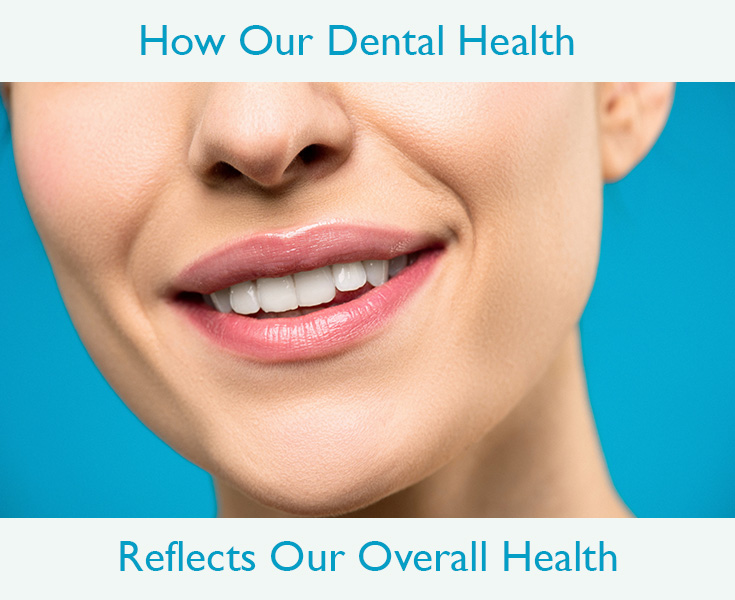Did you know that your mouth can help you identify specific health issues in your body? There’s a connection between your oral health and overall health — and that’s due to how bacteria accumulate. If you want to improve your well-being, you should keep an eye on your mouth.

Bacteria’s Role in Our Well-Being
Humans have both good and bad bacteria in their bodies. If you have too many good bacteria, you can feel bloated and nauseous. If you have too many bad bacteria, you’ll become sick with illnesses like strep throat. It’s crucial to balance your bacteria levels to stay healthy.
Consider your mouth as an entry point for bacteria. If you keep your mouth clean with proper brushing and flossing techniques, your body will be better at combating bad bacteria. Generally, you shouldn’t get sick often as long as you prioritize both oral and immune health.
Poor Oral Hygiene Causes Specific Medical Issues
If you never brushed or flossed your teeth, you’d experience infections like gum disease and tooth decay. These conditions lead to bleeding gums, tooth loss, bone damage and more. It can even cause permanent damage to your mouth’s health. However, you can also develop additional health issues.
Many problems stem from inadequate oral hygiene, including cardiovascular disease, endocarditis and rheumatoid arthritis. That’s because when you don’t brush and floss as you should, your mouth will collect excess bad bacteria, which end up in your body. This bacteria will spread to your blood, lungs and other areas to cause health issues.
Keep in mind that you can still experience dental problems when you practice proper oral hygiene. Concerns like cavities can happen to anyone. If you visit your dentist immediately, you should be OK — but more dangerous health occurrences like enamel erosion will occur when you ignore them. Those situations open the door for additional wellness issues.
Can Oral Health Conditions Point to Other Concerns?
Remember that the reverse can happen, too. While poor oral hygiene can lead to diseases and conditions, you can also use your mouth to identify underlying conditions. If you notice dental issues even though you practice proper oral care, you might have other health concerns.
Those with diabetes, HIV/AIDS, blood cell disorders, Alzheimer’s and osteoporosis can have oral health issues in addition to other symptoms. That’s mainly due to how such conditions lower the immune system’s effectiveness. These illnesses can also have specific indicators, like how HIV/AIDS creates painful canker sores in the mouth, while osteoporosis leads to tooth loss.
Therefore, you need to pay attention to your oral health because you might be able to catch other medical conditions.
Common Signs of Inadequate Oral Health
If you have dental issues, you might experience symptoms like:
- Bleeding gums after brushing or flossing
- Dry mouth
- Bad breath
- Sensitivity to hot or cold foods and beverages
- Mouth pain
- Loose teeth
- Jaw clicking or popping
Various types of dental issues exist. If you aren’t careful, you can experience gingivitis, cavities, sensitivity and cancer. These are all conditions you may be able to prevent — unless they’re connected to an underlying medical concern. Usually, dentists can work with patients to find solutions.
Try to keep an eye on your gums, teeth and mouth overall so you can spot warning signs when they occur. If you aren’t sure whether something’s amiss, you should contact your dentist to double-check. It’s much better to schedule an appointment than wait around — and cause unnecessary harm to your health in the process.
Ways to Keep Gums and Teeth Healthy
Everyone learns how to care for their gums and teeth at a young age. However, we don’t really change our routines until something goes wrong. It’s smart to evaluate your oral hygiene practices so you can ensure you’re doing the best you can for your overall wellness.
- Floss your teeth gently tooth by tooth before you brush.
- Brush twice daily using a fluoride toothpaste.
- Clean your tongue with your toothbrush.
- Rinse your toothbrush afterward, storing it in an upright position.
- Consider using a fluoride mouthwash for added benefits.
Don’t forget to visit your dentist for a bi-annual checkup, too. That’s the best way to ensure your oral health remains intact. If you have braces, retainers or additional oral health tools, you should maintain them according to your orthodontist’s recommendations. Be sure to schedule appointments with them, as well.
Keep These Points in Mind to Strengthen Your Health
There’s a reason why many experts refer to the mouth as a window to our overall wellness. This area processes all kinds of bacteria — and when we fail to stay on top of our oral hygiene, we can experience ongoing issues. However, we can also discover underlying concerns in the same way. That’s why we should all strive to maintain our dental health.






Speak Your Mind